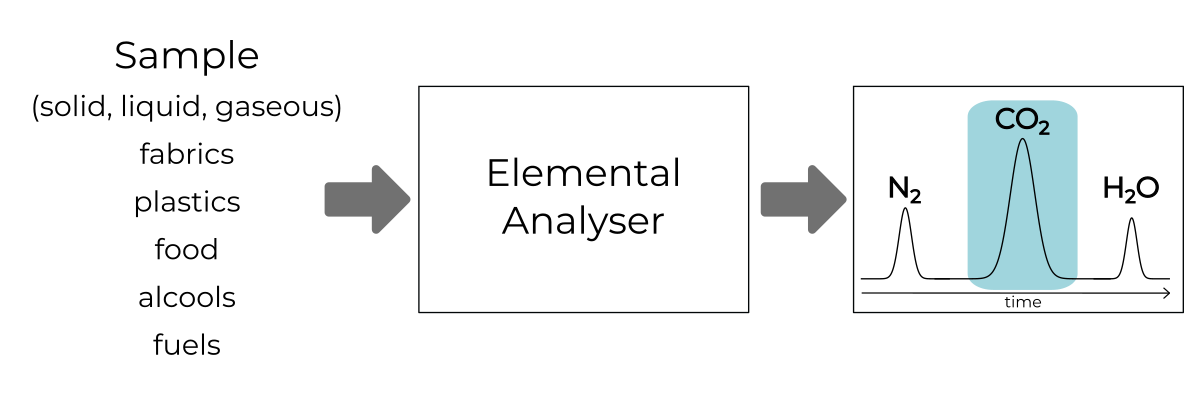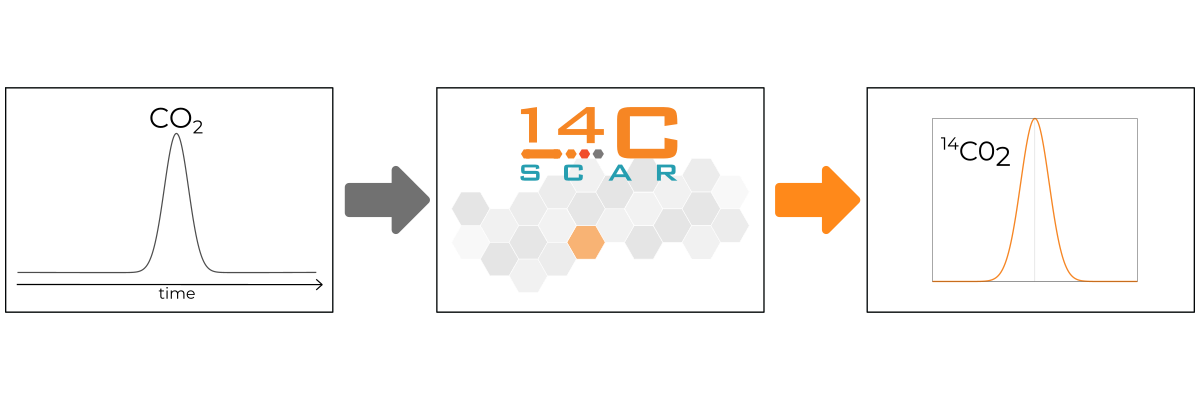Radiocarbon Detection / C14-SCAR for Materials
C14-SCAR for Materials
A transition is underway from fossil-derived materials to biobased, renewable materials. In this context, the need arises to control the fraction of a material that comes from renewable sources, i.e. that is biogenic.
C14-SCAR is able to perform ¹⁴C analysis on various materials such as fabrics, plastics, fuels, solvents with measurement times comparable to Accelerator Mass Spectrometry (AMS) and with far greater precision and versatility than Liquid Scintillation Counting (LSC).
Measurement process explained
C14-SCAR can measure solid, liquid, and gaseous samples of various types, such as plastics, textiles, fuels, ethanol. The complete process leading to the 14C concentration value involves two main steps:
1. Sample preparation and burning
The carbon content of the sample must be enough to fill the measurement cell with a 0.7 L net volume at the optimal pressure of 13 mbar.
In order to be measured by the C14-SCAR instrument, any solid or liquid sample must be converted to pure CO2 gas by combustion in an Elemental Analyser.

2. Purification and measurement
After combustion the gas is almost ready to be injected into the C14-SCAR measuring cell by means of an automated procedure.
The gas produced by the elemental analyser is trapped and purified inside C14-SCAR and transferred to the measuring cell.
When the measuring cell has been filled to the correct pressure, the Saturated CAvity Ring-down process begins and measurements are taken.
The analysis result is provided automatically after the measurement.

Performances
14C-SCAR is a very versatile instrument, it achieves excellent sensitivity at low measurement times, has a very wide dynamic range, about 4 decades, and requires a modest amount of sample to operate.
With measurement times in the order of 120min 14C-SCAR achieves sub-pmc accuracies.
–
MIN
TYP
MAX
UNIT
CARBON SAMPLE MASS
6
8
–
mg
PRECISION
–
–
–
–
12min
1
1.5
–
pMC
60min
0.4
0.6
–
pMC
240min
0.2
0.3
–
pMC
ACCURACY
0.2
0.5
–
%
MEASUREMENT RANGE
1
–
pMC
LIMIT OF DETECTION
1
–
–
pMC
CARBON SAMPLE MASS [mg]
MIN
6
TYP
8
MAX
–
PRECISION@12min [pMC]
MIN
1
TYP
1.5
MAX
–
PRECISION@60min [pMC]
MIN
0.4
TYP
0.6
MAX
–
PRECISION@120min [pMC]
MIN
0.2
TYP
0.3
MAX
–
ACCURACY [%]
MIN
0.2
TYP
0.5
MAX
–
MEASUREMENT RANGE [pMC]
MIN
1
TYP
–
MAX
104
LIMIT OF DETECTION [pMC]
MIN
1
TYP
–
MAX
–
C14-SCAR for Materials
A transition is underway from fossil-derived materials to biobased, renewable materials. In this context, the need arises to control the fraction of a material that comes from renewable sources, i.e. that is biogenic.
C14-SCAR is able to perform ¹⁴C analysis on various materials such as fabrics, plastics, fuels, solvents with measurement times comparable to Accelerator Mass Spectrometry (AMS) and with far greater precision and versatility than Liquid Scintillation Counting (LSC).
Measurement process explained
C14-SCAR can measure solid, liquid, and gaseous samples of various types, such as plastics, textiles, fuels, ethanol. The complete process leading to the 14C concentration value involves two main steps:
1. Sample preparation and burning
The carbon content of the sample must be enough to fill the measurement cell with a 0.7 L net volume at the optimal pressure of 13 mbar.
In order to be measured by the C14-SCAR instrument, any solid or liquid sample must be converted to pure CO2 gas by combustion in an Elemental Analyser.

2. Purification and measurement
After combustion the gas is almost ready to be injected into the C14-SCAR measuring cell by means of an automated procedure.
The gas produced by the elemental analyser is trapped and purified inside C14-SCAR and transferred to the measuring cell.
When the measuring cell has been filled to the correct pressure, the Saturated CAvity Ring-down process begins and measurements are taken.
The analysis result is provided automatically after the measurement.

Performances
14C-SCAR is a very versatile instrument, it achieves excellent sensitivity at low measurement times, has a very wide dynamic range, about 4 decades, and requires a modest amount of sample to operate.
With measurement times in the order of 120min 14C-SCAR achieves sub-pmc accuracies.
–
MIN
TYP
MAX
UNIT
CARBON SAMPLE MASS
6
8
–
mg
PRECISION
–
–
–
–
12min
1
1.5
–
pMC
60min
0.4
0.6
–
pMC
240min
0.2
0.3
–
pMC
ACCURACY
0.2
0.5
–
%
MEASUREMENT RANGE
1
–
pMC
LIMIT OF DETECTION
1
–
–
pMC
CARBON SAMPLE MASS [mg]
MIN
6
TYP
8
MAX
–
PRECISION@12min [pMC]
MIN
1
TYP
1.5
MAX
–
PRECISION@60min [pMC]
MIN
0.4
TYP
0.6
MAX
–
PRECISION@120min [pMC]
MIN
0.2
TYP
0.3
MAX
–
ACCURACY [%]
MIN
0.2
TYP
0.5
MAX
–
MEASUREMENT RANGE [pMC]
MIN
1
TYP
–
MAX
104
LIMIT OF DETECTION [pMC]
MIN
1
TYP
–
MAX
–